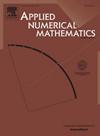A block α-circulant based preconditioned MINRES method for wave equations
IF 2.2
2区 数学
Q1 MATHEMATICS, APPLIED
引用次数: 0
Abstract
In this work, we propose an absolute value block α-circulant preconditioner for the minimal residual (MINRES) method to solve an all-at-once system arising from the discretization of wave equations. Motivated by the absolute value block circulant preconditioner proposed in McDonald et al. (2018) [40], we propose an absolute value version of the block α-circulant preconditioner. Since the original block α-circulant preconditioner is non-Hermitian in general, it cannot be directly used as a preconditioner for MINRES. Our proposed preconditioner is the first Hermitian positive definite variant of the block α-circulant preconditioner for the concerned wave equations, which fills the gap between block α-circulant preconditioning and the field of preconditioned MINRES solver. The matrix-vector multiplication of the preconditioner can be fast implemented via fast Fourier transforms. Theoretically, we show that for a properly chosen α the MINRES solver with the proposed preconditioner achieves a linear convergence rate independent of the matrix size. To the best of our knowledge, this is the first attempt to generalize the original absolute value block circulant preconditioner in the aspects of both theory and performance the concerned problem. Numerical experiments are given to support the effectiveness of our preconditioner, showing that the expected optimal convergence can be achieved.
求助全文
约1分钟内获得全文
求助全文
来源期刊

Applied Numerical Mathematics
数学-应用数学
CiteScore
5.60
自引率
7.10%
发文量
225
审稿时长
7.2 months
期刊介绍:
The purpose of the journal is to provide a forum for the publication of high quality research and tutorial papers in computational mathematics. In addition to the traditional issues and problems in numerical analysis, the journal also publishes papers describing relevant applications in such fields as physics, fluid dynamics, engineering and other branches of applied science with a computational mathematics component. The journal strives to be flexible in the type of papers it publishes and their format. Equally desirable are:
(i) Full papers, which should be complete and relatively self-contained original contributions with an introduction that can be understood by the broad computational mathematics community. Both rigorous and heuristic styles are acceptable. Of particular interest are papers about new areas of research, in which other than strictly mathematical arguments may be important in establishing a basis for further developments.
(ii) Tutorial review papers, covering some of the important issues in Numerical Mathematics, Scientific Computing and their Applications. The journal will occasionally publish contributions which are larger than the usual format for regular papers.
(iii) Short notes, which present specific new results and techniques in a brief communication.
 求助内容:
求助内容: 应助结果提醒方式:
应助结果提醒方式:


